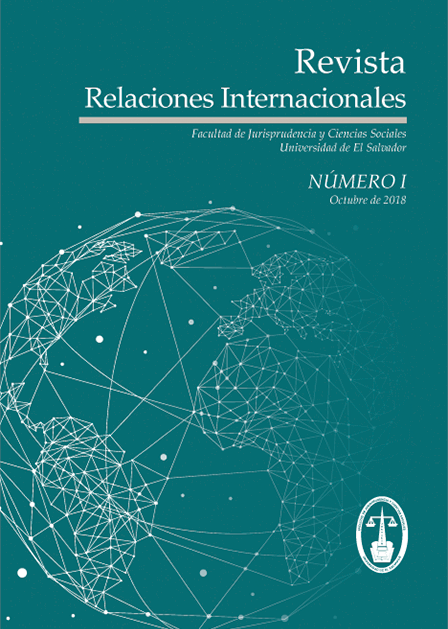A historical look at the Kurdish people: difficulties for their self-determination
Keywords:
Confederate State, Autonomy, Self Determination, United Nations, Ethnic minorityAbstract
Kurdistan, people not recognized as a State, settled mainly in four states of the Middle East, almost more than 90 years after the Treaty of Sevres was recognized as an independent State; This treaty was never ratified and began a turning point following the conclusion of the Treaty of Lausanne in 1923, in which, Kurdistan is hindered from obtaining its independence mainly due to the centralization of the Turkish state and nationalist groups against the Kurdish autonomy; After a series of revolts since 1930, the nationalist and identity sentiments of the Kurdish people, divided between four nations: Iraq, Iran, Syria and Turkey, intensify in which, in addition, a large part of the reserves of crude oil worldwide is identified. In this way, they are so called as an ethnic minority, more than 30 million people violating their right to self-determination, a principle recognized within the framework of the United Nations. in the present investigation some difficulties arise for its recognition as a possible Kurdish confederation from the reality in which they currently live. Reality that must be concordant based on respect for the political, cultural, religious and even territorial ideals of each of the countries in which they are settled. The 21st century has been greatly advanced and still many people around the world are still being repressed in the search for their autonomy.
Downloads
References
Sultanato: Territorio bajo la jurisdicción de un sultán. Oxford. University Press. (Oxford,
Reino Unido: Edit. Oxford University. 2018). Disponible en: https://es.oxforddictionaries.com/definicion/sultanato
Derecho Internacional Público. “Tratado de Sévres 1920” (Facultad de Derecho y Ciencias Políticas, Universidad Católica de La Plata, 2010). Disponible en: https://www.dipublico.org/3680/tratado-de-sevres-1920/.
Carlos Pazmiño, La solución sin Estado: Apuntes sobre el Confederalismo Democrático y el Partido de los Trabajadores del Kurdistán (Ecuador: FLACSO, Centro de Estudios Patricio Ycaza, 2015) Disponible en: http://diferencias.com.ar/congreso/ICLTS2015/ponencias/Mesa%2025/_ICLTS2015_Mesa25_Pazmi%C3%B1o.pdf
David Pérez, El problema kurdo en Turquía: una cuestión de permanente actualidad (España:Universidad de Valladolid, 2007). Disponible en: http://uvadoc.uva.es/bitstream/10324/17894/1/Investigaciones-2007-27-Problema-Kurdo-Turquia.pdf
Ismael Besikci. Kurdistán, Una Colonia Internacional. Reflexiones críticas sobre la realidad del pueblo turco, Colección problemas internacionales (Madrid: Ipala editorial (versión española) 1992, 1-258.
Alejandro Ciordia, “Breve historia del conflicto kurdo en Turquía”, Ágora Revista Online (2016). https://www.researchgate.net/publication/312367682
Suphi Toprak y Baran Serhad. “Historia y presente del Partido de los Trabajadores del Kurdistán (PKK). Periódico La Izquierda, sección cultura. (08 de diciembre de 2015). https://www.laizquierdadiario.com/Historia-y-presente-del-partido-de-los-Trabajadoresdel-Kurdistan-PKK
Graciela Salas, “El concepto de pueblo”, Seminario sobre Actualización en Doctrina y Jurisprudencia Internacional, Vol. N° 1 Universidad Nacional de Córdoba, Argentina. (2012). https://revistas.unc.edu.ar/index.php/recordip/article/viewFile/1959/961
Rafael Calduch. “Relaciones Internacionales. El Estado, el pueblo y la nación”. (Madrid: Ediciones en Ciencias Sociales, 1991), 29. https://www.ucm.es/data/cont/media/www/pag-55159/lib1cap6.pdf
Rafael Calduch. “Relaciones Internacionales. El Estado, el pueblo y la nación”. 13 Romualdo Bermejo, “El Derecho a la Autodeterminación de los Pueblos a la Luz del Derecho Internacional”. Revista española de Derecho Internacional, (2018). http://www.wshrw.org/Documentos/espa%C3%B1ol/An%C3%A1lisis/Bermejo_Ref_ONUAutodet.pdf
Organización de las Naciones Unidas, Carta de las Naciones Unidas (San Francisco: Organización de las Naciones Unidas, 1945), Art. 2. https://www.oas.org/36ag/espanol/doc_referencia/Carta_NU.pdf
Andrés Mourenza, “La ONU acusa a Turquía de graves violaciones de Derechos Humanos en el conflicto kurdo”, Periódico El País (2017). https://elpais.com/internacional/2017/03/10/actualidad/1489140198_236742.html
“Identidades y divisiones en el Oriente Medio”, El Imperio de Des, 2015. https://elimperiodedes.wordpress.com/2015/11/26/identidades-y-divisiones-en-el-oriente-medio/)
Downloads
Published
How to Cite
Issue
Section
License
Copyright (c) 2020 Revista Relaciones Internacionales

This work is licensed under a Creative Commons Attribution-NonCommercial 4.0 International License.
The authors transfer the copyright rights in favor of the Faculty of Jurisprudence and Social Sciences of the University of El Salvador (through Aequus Editorial) to include their writing in Revista Relaciones Internacionales.








